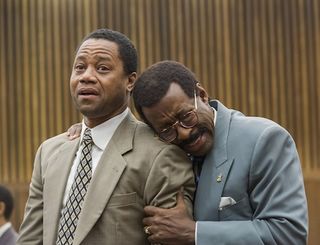Next TV SF: Network Brands More Important Than Ever, FX Execs Say

San Francisco – As over-the-top options have expanded the TV universe to more than 400 scripted shows, the value of network brands have never been more important, the two FX Networks copresidents of original programming said here Wednesday at the Next TV Summit & Expo.
“In a way, as programmers, we’re marketing a brand,” Nick Grad said in an afternoon keynote discussion about premium, original programming at the day-long event, hosted by Multichannel News and Broadcasting & Cable. “I think that brand has a lot of value in this climate…brand is more important than it’s ever been.”
A network’s brand, he added, “is a real asset to have in order to cut through the clutter.”
The other copresident of original programming at FX Networks and FX Productions, Eric Schrier, amplified and refined their CEO John Landgraf’s statement last August that “there is simply too much television.”
“There is a lot more good television getting in the way of great television,” Schrier said. “It is as difficult to find a great television show now as it was 10 years, 15 years ago.… It’s still a rare, hard thing to find.”
A proliferation of content being pumped out by OTT competition requires programmers to “take bigger swings at the plate,” Schrier added. “You also have to try to do more unique and distinctive programming in this landscape.”
FX, he said, tried and succeeded to break new ground with its ten-episode series, The People v. O.J. Simpson: American Crime Story, which sought to offer a new perspective on a well-known story.
Broadcasting & Cable Newsletter
The smarter way to stay on top of broadcasting and cable industry. Sign up below
“I think that’s why it caught on,” Schrier said. “People felt like it was something new."
And the FX execs also acknowledged that they are now in a business in which a show can be successful in a number of ways, and not be judged solely by ratings.
“A home run is … both a huge critical hit and a huge ratings hit,” Grad said, warning that focusing too much on ratings can cause programmers to micromanage their talent.
“We want the best possible version of that show. Hopefully it will be seen by the audience it deserves to be seen by,” Grad said.
They also discussed a collaborative process that allows for disagreement but one that ultimately finds common ground before moving to the next phase.
“We go back to the creators with one point of view,” Schrier said, noting that is a rarity in the TV business.
“We make it a priority to be together enough to really all be kind of all of one mind,” Grad sad. “Sometimes we'll disagree… but we'll figure it out behind closed doors."
Giving creators notes that can sometimes present contradictory views can drive those creators crazy. “They can’t reconcile it, and it creates a lot of extra work, and they just get burned out,” Grad said.
Grad and Schrier both said FX continues to take a vigilant approach in the way its networks are programmed despite surging OTT competition from Netflix and others that are aggressively pursuing and striking deals for TV series.
“We never order shows straight to series or make two-season commitments because we believe in the development process,” Schrier said. “We don't make a pilot just to try something out. when we make a pilot, we're talking about making a series.”
By way of example, he pointed out that about 70% of the pilot for Sons of Anarchy was reshot and a major role was recast.
“If we went straight to series on that show it would have never been the success it ended up being,” Schrier said. “We believe in the process. We try not to get caught up in the craziness of these entrants that...can just throw money at the problem."
